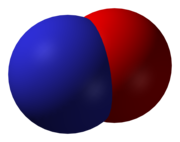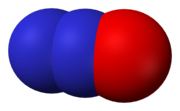Nitrogen oxide
Appearance
Nitrogen oxide may refer to a binary compound of oxygen and nitrogen, or a mixture of such compounds:
Charge-neutral
[edit]- Nitric oxide (NO), nitrogen(II) oxide, or nitrogen monoxide
- Nitrogen dioxide (NO2), nitrogen(IV) oxide
- Nitrogen trioxide (NO3), or nitrate radical
- Nitrous oxide (N2O), nitrogen(0,II) oxide
- Dinitrogen dioxide (N2O2), nitrogen(II) oxide dimer
- Dinitrogen trioxide (N2O3), nitrogen(II,IV) oxide
- Dinitrogen tetroxide (N2O4), nitrogen(IV) oxide dimer
- Dinitrogen pentoxide (N2O5), nitrogen(V) oxide, or nitronium nitrate [NO2]+[NO3]−
- Nitrosyl azide (N4O), nitrogen(−I,0,I,II) oxide
- Nitryl azide (N4O2)
- Oxatetrazole (N4O)
- Trinitramide (N(NO2)3 or N4O6), nitrogen(0,IV) oxide
Anions
[edit]| Name | Formula |
|---|---|
| Nitroxide | O=N− or NO− |
| Nitrite | O=N−O− or NO−2 |
| Nitrate | O2N−O− or NO−3 |
| Peroxynitrite | O=N−O−O− or NO−3 |
| Peroxynitrate | O2N−O−O− or NO−4 |
| Orthonitrate | +N(−O−)4 or NO3−4 |
| Hyponitrite | −O−N=N−O− or N2O2−2 |
| Trioxodinitrate or hyponitrate | O=N−N(−O−)2 or N2O2−3 |
| Nitroxylate | (−O−)2N−N(−O−)2 or N2O4−4 |
| Dinitramide | O2N−N−−NO2 or N3O−4 |
Cations
[edit]- Nitrosonium (N≡O+ or [NO]+)
- Nitronium (O=N+=O or [NO2]+)
Atmospheric sciences
[edit]- NOx (or NOx) refers to the sum of NO and NO2.[1][2]
- NOy (or NOy) refers to the sum of NOx and all oxidized atmospheric odd-nitrogen species (e.g. the sum of NOx, HNO3, HNO2, etc.)
- NOz (or NOz) = NOy − NOx
- Mixed Oxides of Nitrogen ("MON"): solutions of nitric oxide in dinitrogen tetroxide/nitrogen dioxide.
-
Nitric oxide, NO
-
Nitrogen dioxide, NO2
-
Nitrous oxide, N2O
-
Dinitrogen trioxide, N2O3
-
Dinitrogen tetroxide, N2O4
-
Dinitrogen pentoxide, N2O5
-
Trinitramide, N4O6
Stability
[edit]Due to relatively weak N–O bonding, all nitrogen oxides are unstable with respect to N2 and O2, which is the principle behind the catalytic converter, and prevents the oxygen and nitrogen in the atmosphere from combusting.
See also
[edit]- Nitrate
- Nitrogen oxide sensor
- Sulfur nitrides, which are valence isoelectronic with nitrogen oxides
References
[edit]- ^ United States Clean Air Act, 42 U.S.C. § 7602
- ^ Seinfeld, John H.; Pandis, Spyros N. (1997), Atmospheric Chemistry and Physics: From Air Pollution to Climate Change, Wiley-Interscience, ISBN 0-471-17816-0






